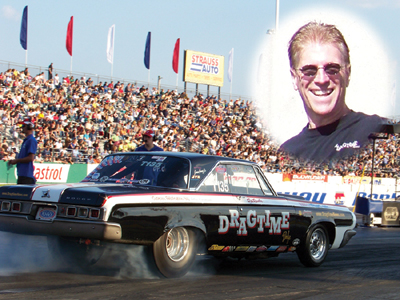| (Article
begins on the Bracket Racing 101 page HERE)
 Bracket
racing constantly changes from season to season. Cars and
drivers perform differently in summer and fall. Now that
we’re getting into the autumn months, let’s
take a look at some of the ways to adjust for racing in
the fall. Bracket
racing constantly changes from season to season. Cars and
drivers perform differently in summer and fall. Now that
we’re getting into the autumn months, let’s
take a look at some of the ways to adjust for racing in
the fall.
We’ve
all seen racers warming up their cars on jack stands right
after unloading from the trailer. Regardless of the season,
warm-ups are critical to consistency; you want the vehicle
to be just as heat-cycled for the first time shot as for
1st Round. Yet in the Fall when the air is cool or even
downright cold, I’ve seen racers warm their cars only
once, after which the car sits until 1st Round, then sits
again before 2nd Round. Because of the ambient air temperature
it cools down too much and becomes inconsistent. During
the cooler months I’ll warm the Dodge before time
shots, again before 1st Round, and maybe even again before
2nd Round depending on how long it’s been sitting.
On the
flip-side, this quick cool-down is a benefit to racing in
the Fall months: it’s a great time to enter two classes
if your track allows it because it’s so much easier
to get the vehicle cooled down between rounds. I regularly
race the Dodge in Super Pro and Pro on the same day. In
the Summer this can be tough: I’m constantly running
the fan and water pump for long periods after making a pass,
and as a result my charging system takes a beating. This
is not so much of an issue in the Fall.
The
sun becomes problematic during the Autumn months. It sets
earlier in the day and it spends more time at the horizon
as it does. In the Summer, the sun’s path goes directly
overhead in the sky and takes a straight shot down to the
horizon as it sets; it spends less time hanging there in
your line of sight. In the Autumn the sun’s path throughout
the day is lower in the sky and it takes almost a sideways
approach to the horizon; as a result it spends more time
close to the horizon as it sets. If you race at a track
that faces west, you’ll be looking straight into the
sun late in the day as you’re trying to see the Tree.
In this case sunglasses and a spotless windshield will help.
If your track faces east, the sun will be behind you and
will be flooding the tree with light, making it tough to
see when the amber bulbs light up. In either of these conditions
it’s likely that your reaction time will change. You’ll
have to either take some out of the box, or raise the launch
RPM and / or take some extra bumps into the starting line.
On a related note: I used to race regularly at a track that
has a unique sun phenomenon. As the sun approaches the horizon
during the late Summer months, the tree is in shade except
for the top amber of the right lane. When footbraking the
Dodge in Super Pro at this track I would always take the
left lane. I was betting on my top-bulb opponent not making
the necessary adjustment to account for his or her top bulb
being flooded with light. It worked more often than not.
The moral: know your track.
If you’ve
changed the tune of your carburetor for the summer months,
now’s the time to think about changing it back. I’ve
become more judicious about tuning my carb for reaction
time. Reaction time is a moving target, and in March, when
it’s downright cold, I’ll run some pretty big
squirters and will play with the jetting all to get the
car to leave on time. Once I find a set-up that works, I
log the data into my log book, then I leave the car alone
and go about racing. A few months later when it’s
becoming hot and humid I’ll take jetting and squirter
back out of it if I see the reaction time going away. In
the fall I’m on the lookout for the reaction time
going away again, at which time I refer to my log book and
put it back the way it was in the spring. |



